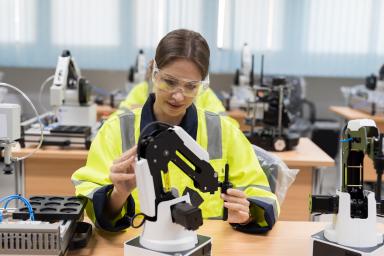5 ways for small businesses to cut their transport emissions
Just as start-ups can create new businesses for the future, green energy is likely to be the future of transport as vehicles switch away from burning fossil fuels such as petrol and diesel.
According to the Department of Transport, in 2022 28% of the UK's greenhouse gas (GHG) emissions were from transport.
Lowering carbon emissions doesn't have to involve making big changes, either.
Switching over how you and your employees commute to work or changing how your products and services are transported to customers makes an impact and helps reduce your carbon footprint.
Small businesses will be vital in helping the UK reach its 2050 net-zero goal. Adopting greener transport options will be a key part of this.
Five ways to reduce small business transport emissions
1. Consider using electric vehicles
From small electric delivery vans used by sustainable start-ups to switching to an electric car when travelling to work, eco-friendly transport is set to be the future as the UK plans to ban the sale of new petrol or diesel cars from 2030.
Because batteries rather than fossil fuels power electric vehicles, they don't directly produce GHG emissions.
However, unless you charge your vehicle using renewable electricity sources, electric vehicles can be responsible for carbon emissions by using national grid electricity.
In the UK, each kWh of electricity used produces roughly 0.212kg of C02 - fully charging a 75kWh car battery may generate around 15.9kg of C02.
However, driving the same distance of 250 miles in a medium-sized petrol car could produce up to 75kg of C02. Going electric could also save you money through lower fuel costs, and you may be viable for funding, such as the plug-in grant.
2. Set up a carpool scheme
A 2023 study showed that over 60% of journeys made by cars and vans between 2002 and 2018 are single occupancy, with only one person in the vehicle.
Encouraging employees living near each other to share car journeys to work is likely to help reduce emissions by reducing the number of cars on the road.
Carpooling may help staff by fostering greater communication and sharing costs such as fuel and parking, resulting in a cheaper commute.
3. Avoid unnecessary business travel
Covid-19 resulted in travel restrictions that saw many businesses embrace remote working and video conferencing for meetings, reducing the need for face-to-face meetings.
The carbon-cutting impact of digital conferencing could be significant when used as an alternative to international business travel.
International aviation emissions more than doubled from 16 MtCO2e (million tonnes of carbon dioxide equivalent) to 37 MtCO2e in the period 1990- 2019, a 138% increase, according to the Department of Transport.
4. Encourage cycling to work schemes
Getting employees on the saddle could cut your company's GHG emissions and improve their health. Cycling is a zero-emission transport and an aerobic activity that can increase fitness.
Research published in the British Medical Journal found that cycling contributes to improved mental wellbeing and reduced stress.
Challenges such as 'cycle to work week' can be compelling motivators, and you could also make cycling to work more accessible by installing bike racks. The government has a helpful guide for businesses introducing a cycle to work scheme.
5. Source local suppliers with electric or fuel-free vehicles
GHG emissions aren't just limited to the emissions your business directly generates.
In reducing your business' carbon footprint, it could be useful to consider how emissions are produced along the value chain.
A value chain includes all the different activities that occur from concept to trading, such as the design, raw materials, production, and distribution of a product or service.
It considers the full lifecycle of a product or service, and the value created for the end-use consumer.
Assess whether switching to local suppliers, for example, can help reduce carbon emissions.
Even small changes, such as planning for supplies or deliveries to be made in as few a number of journeys as possible, can help.
Five driving tips for cutting transport emissions
While moving away from fossil-fuel-powered vehicles can help lower GHG emissions, cost and convenience can be obstacles for some start-up business owners.
During this transition period, if you are using a petrol or diesel car for now, several simple driving behaviours may help reduce your emissions.
1. Service your car regularly
Keeping your engine in tip-top condition can boost fuel efficiency and extend your vehicle's lifespan, with the RAC reporting that regularly changing engine oil and using a cleaning agent may help to reduce emissions.
2. Travel light
The more weight your car has to carry, the more fuel it consumes, so avoid keeping heavy items like sports equipment in the back.
According to research by KwikFit, an additional 50kg of weight may push your fuel consumption up by 2%, so don't use your boot as a storeroom.
It may be sensible not to have bike racks or lockers on your car except when they are in use; they can add weight and increase drag from the wind.
3. Don't idle
Leaving your engine on while stationary can be inefficient, according to the AA.
Car engines can warm up more quickly when moving, and a car running while idle may simply be wasting fuel.
4. Check your tyre pressure regularly
If your tyres are underinflated, your car has to work harder and will use more fuel as a result.
Check your tyre pressure regularly and before every long journey, advises the AA.
5. Open the windows
Air conditioning can increase your fuel consumption at lower speeds, according to the AA, making it more efficient to open your car windows at slower speeds during hot weather.
Learn with Start Up Loans and help make your business born sustainable.
Thinking of starting a sustainable business? Check out our free online courses in partnership with The Open University on environmental decision-making and how organisations impact the environment.
Our free Learn with Start Up Loans courses include:
Plus free courses on climate and sustainability, teamwork, entrepreneurship, mental health and wellbeing.
Disclaimer: The Start -Up Loans Company makes reasonable efforts to keep the content of this article up to date, but we do not guarantee or warrant (implied or otherwise) that it is current, accurate or complete. This article is intended for general information purposes only and does not constitute advice of any kind, including legal, financial, tax or other professional advice. You should always seek professional or specialist advice or support before doing anything on the basis of the content of this article.
The Start-Up Loans Company is not liable for any loss or damage (foreseeable or not) that may come from relying on this article, whether as a result of our negligence, breach of contract or otherwise. “Loss” includes (but is not limited to) any direct, indirect or consequential loss, loss of income, revenue, benefits, profits, opportunity, anticipated savings, or data. We do not exclude liability for any liability which cannot be excluded or limited under English law. Reference to any person, organisation, business, or event does not constitute an endorsement or recommendation from The Start-Up Loans Company, its parent company British Business Bank plc, or the UK Government.
Your previously read articles
Sign up for our newsletter
Just add your details to receive updates and news from Start Up Loans
Sign up to our newsletter


